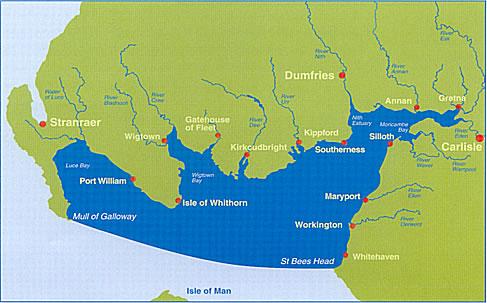
Levels of radioactive pollution at the a military training range in South West Scotland are the highest level recorded since studies began, new research by the Government's Defence, Science and Technology Laboratory has found.
The range near Kirkcudbright has been used for many years to test depleted uranium munitions and it was again at the centre of controversy last month following the announcement that there was to be a resumption of limited testing.
The Government Laboratory carries out a annual survey and soil samples taken from the (Dundrennan) range in 2006 have been found to contain levels of depleted uranium (DU) above certain safety limits. and are higher than any figure recorded since comparable studies began in 1996. Samples examined during 2006 contained more than 50 millibecquerels of radioactivity per gram (mBq/g) - which is seen as the typical level for UK soil.
The latest revelation has led to renewed concern from local politicians and environmental groups.
Dundrennan is one of a number of military ranges that the British Ministry of Defence (MoD) use in the North Irish sea area. In addition to base/range ground contamination areas offshore have been polluted by both conventional and depleted uranium (DU) munitions debris.
Whilst recently the focus has been on DU pollution from Dundrennan what is less well publicised is that the Royal Navy several years ago also fired considerable quantities of DU ammunition into areas to the west of the current test site.
The Celtic League which has consistently opposed British military activity harmful to the ecology of an area which is the common heritage of all the peoples around the Irish sea deplored the recent decision to resume testing, albeit on a limited scale. The League hope the MoD will acknowledge the concerns expressed and instate a moratorium on any future DU munitions testing.
Statistics for Dundrennan tests below (please note these figures to not include munitions fired from the Quinetiq weapons test site at Eskmeals in Cumbria or the Royal Navy tests - referred to above - in the North Channel area):
1982: 9 1983: 56 1984: 194 1985: 152 1986: 118 1987: 151 1988: 272 1989: 434 1990: 783 1991: 666 1992: 781 1993: 682 1994: 458 1995: 286 1996: 105 1997: 734 1998: 134 1999: 136 2000: 270 2001: 126 2002: 0 2003: 192 2004: 0 2005: 0 2006: 0 2007: 0 2008: ?
Total: 6,739
Related articles on this topic on Celtic News at:
(voir le site) (voir le site) (voir le site) (voir le site) (voir le site) (voir le site) (voir le site) (voir le site) (voir le site) (voir le site) (voir le site)
J B Moffatt Director of Information Celtic League
17/04/08
 The Celtic League has branches in the six Celtic Countries. It works to promote cooperation between these countries and campaigns on a broad range of political, cultural and environmental matters. It highlights human rights abuse, monitors all military activity and focuses on socio-economic issues.
TEL (UK) 01624 877918
MOBILE (UK)07624 491609
(voir le site)
The Celtic League has branches in the six Celtic Countries. It works to promote cooperation between these countries and campaigns on a broad range of political, cultural and environmental matters. It highlights human rights abuse, monitors all military activity and focuses on socio-economic issues.
TEL (UK) 01624 877918
MOBILE (UK)07624 491609
(voir le site)